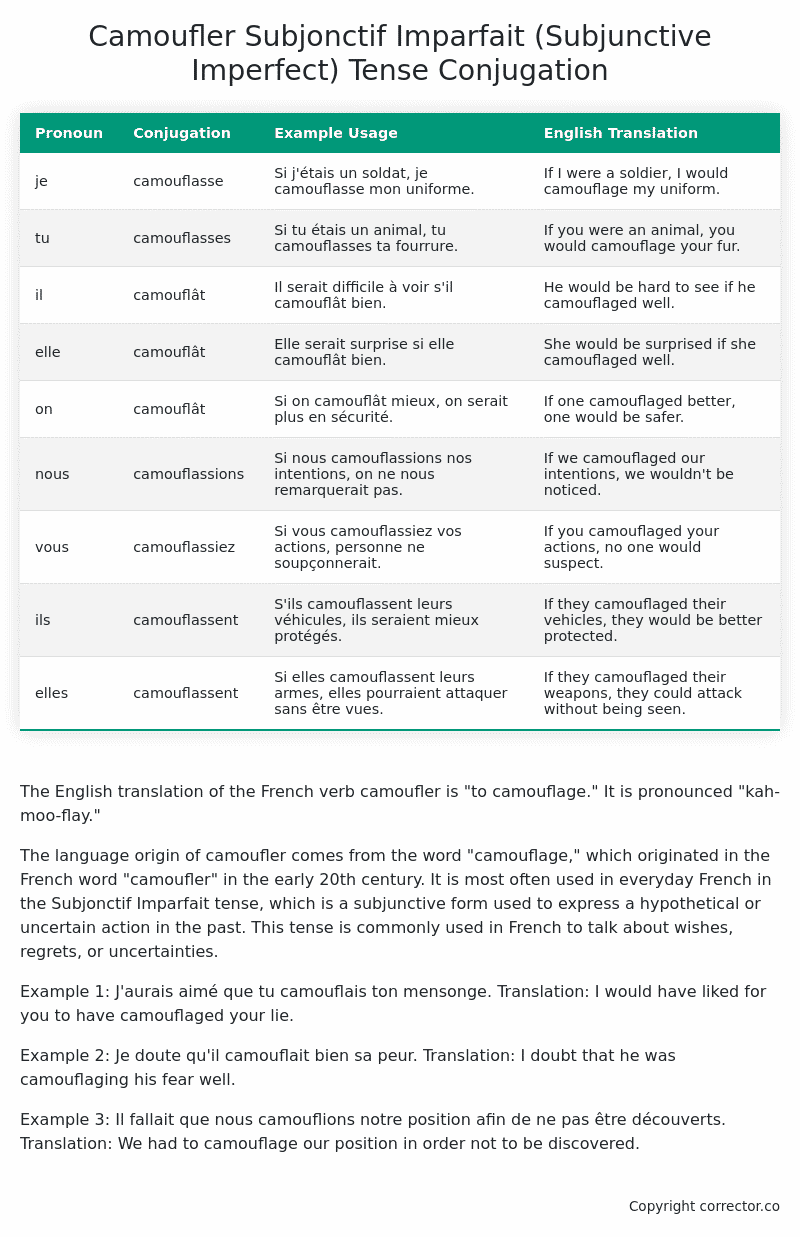Subjonctif Imparfait (Subjunctive Imperfect) Tense Conjugation of the French Verb camoufler
Introduction to the verb camoufler
The English translation of the French verb camoufler is “to camouflage.” It is pronounced “kah-moo-flay.”
The language origin of camoufler comes from the word “camouflage,” which originated in the French word “camoufler” in the early 20th century. It is most often used in everyday French in the Subjonctif Imparfait tense, which is a subjunctive form used to express a hypothetical or uncertain action in the past. This tense is commonly used in French to talk about wishes, regrets, or uncertainties.
Example 1: J’aurais aimé que tu camouflais ton mensonge.
Translation: I would have liked for you to have camouflaged your lie.
Example 2: Je doute qu’il camouflait bien sa peur.
Translation: I doubt that he was camouflaging his fear well.
Example 3: Il fallait que nous camouflions notre position afin de ne pas être découverts.
Translation: We had to camouflage our position in order not to be discovered.
Table of the Subjonctif Imparfait (Subjunctive Imperfect) Tense Conjugation of camoufler
| Pronoun | Conjugation | Example Usage | English Translation |
|---|---|---|---|
| je | camouflasse | Si j’étais un soldat, je camouflasse mon uniforme. | If I were a soldier, I would camouflage my uniform. |
| tu | camouflasses | Si tu étais un animal, tu camouflasses ta fourrure. | If you were an animal, you would camouflage your fur. |
| il | camouflât | Il serait difficile à voir s’il camouflât bien. | He would be hard to see if he camouflaged well. |
| elle | camouflât | Elle serait surprise si elle camouflât bien. | She would be surprised if she camouflaged well. |
| on | camouflât | Si on camouflât mieux, on serait plus en sécurité. | If one camouflaged better, one would be safer. |
| nous | camouflassions | Si nous camouflassions nos intentions, on ne nous remarquerait pas. | If we camouflaged our intentions, we wouldn’t be noticed. |
| vous | camouflassiez | Si vous camouflassiez vos actions, personne ne soupçonnerait. | If you camouflaged your actions, no one would suspect. |
| ils | camouflassent | S’ils camouflassent leurs véhicules, ils seraient mieux protégés. | If they camouflaged their vehicles, they would be better protected. |
| elles | camouflassent | Si elles camouflassent leurs armes, elles pourraient attaquer sans être vues. | If they camouflaged their weapons, they could attack without being seen. |
Other Conjugations for Camoufler.
Le Present (Present Tense) Conjugation of the French Verb camoufler
Imparfait (Imperfect) Tense Conjugation of the French Verb camoufler
Passé Simple (Simple Past) Tense Conjugation of the French Verb camoufler
Passé Composé (Present Perfect) Tense Conjugation of the French Verb camoufler
Futur Simple (Simple Future) Tense Conjugation of the French Verb camoufler
Futur Proche (Near Future) Tense Conjugation of the French Verb camoufler
Plus-que-parfait (Pluperfect) Tense Conjugation of the French Verb camoufler
Passé Antérieur (Past Anterior) Tense Conjugation of the French Verb camoufler
Futur Antérieur (Future Anterior) Tense Conjugation of the French Verb camoufler
Subjonctif Présent (Subjunctive Present) Tense Conjugation of the French Verb camoufler
Subjonctif Passé (Subjunctive Past) Tense Conjugation of the French Verb camoufler
Subjonctif Imparfait (Subjunctive Imperfect) Tense Conjugation of the French Verb camoufler (this article)
Subjonctif Plus-que-parfait (Subjunctive Pluperfect) Tense Conjugation of the French Verb camoufler
Conditionnel Présent (Conditional Present) Tense Conjugation of the French Verb camoufler
Conditionnel Passé (Conditional Past) Tense Conjugation of the French Verb camoufler
L’impératif Présent (Imperative Present) Tense Conjugation of the French Verb camoufler
L’infinitif Présent (Infinitive Present) Tense Conjugation of the French Verb camoufler
Struggling with French verbs or the language in general? Why not use our free French Grammar Checker – no registration required!
Get a FREE Download Study Sheet of this Conjugation 🔥
Simply right click the image below, click “save image” and get your free reference for the camoufler Subjonctif Imparfait tense conjugation!

Camoufler – About the French Subjonctif Imparfait (Subjunctive Imperfect) Tense
Formation
Common Everyday Usage Patterns
Interactions with Other Tenses
Subjonctif Présent
Indicatif Passé Composé
Conditional
Conditional Perfect
Summary
I hope you enjoyed this article on the verb camoufler. Still in a learning mood? Check out another TOTALLY random French verb conjugation!


